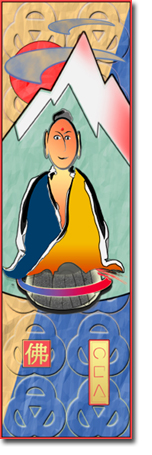On The Way: The Daily Zen Journal
The Activity of the Reality of Life
Kosho Uchiyama (1912-1998)
All of us, regardless of whether we realize it or not, are living out the self as the whole universe. Since this is such a critical point, I’ll repeat it here. Usually we make the idea of the small individual self the center of our world and become firmly convinced that this small individual self is our whole self, but this is not our true self.
The reality of life goes beyond my idea of myself as a small individual. Fundamentally, our self is living out non-dual life that pervades all living things. This self is universal existence, everything that exists.
On the other hand, we usually lose sight of the reality of the life of universal self, clouding it over with thoughts originating from our small individual selves.
When we let go of our thoughts, this reality of life becomes pure and clear. Living out this reality of life as it is – that is, waking up and practicing beyond thinking – is zazen. At this very point our basic attitude in practicing zazen becomes determined. The attitude of the practitioner in practicing zazen as a Mahayana Buddhist teaching never means to attempt to artificially create some new self by means of practice.
Nor should it be aiming at decreasing delusion and finally eliminating it altogether. We practice zazen, neither aiming at having a special mystical experience nor trying to gain greater enlightenment. Zazen as true Mahayana teaching is always the whole self just truly being the whole self, life truly being life.
We all have eyes to see, but if we close them and say that the world is in darkness, how can we say that we are living out the true reality of life? If we open our eyes we see the sun is shining brilliantly. In the same way, when we live open-eyed and awake to life, we discover that we are living in the vigorous light of life.
All the ideas of our small self are clouds that make the light of the universal self foggy and dull. Doing zazen, we let go of these ideas and open our eyes to the clarity of the vital life of universal self.
We discover the attitude of zazen as true Buddhism when we believe that the truth of this small self as an individual entity is universal self and actually practice the reality of life in zazen. This zazen is referred to as the activity of the reality of life.
It can be said that in zazen we “believe and sit,” but then we have to look at the meaning of “believe” in its Buddhist sense. Ordinarily, we use the word “believe” to mean thinking what someone has said is true. In religion when an agent of god or God has said that there exists an invisible, metaphysical realm, that God has such and such powers, or that man has a soul, people have assumed it to be true and have acted accordingly.
This has been called belief or faith. However, in Buddhism the fundamental definition of “belief” is totally different. It is clarity and purity. In Buddhism “belief” does not mean to believe something in one’s mind, such as that every person has an individual soul or that God exists outside us.
Belief in Buddhism is to become clear and pure in actualizing the reality of universal life. We are in fact constantly living out life that pervades everything and goes beyond our individual thoughts, but we easily lose sight of this and become confused. We get carried away by the ideas of our small, individual self.
In zazen we let go of thoughts, lower our level of excitement, and live the universal self just truly being self. This is the basic meaning of belief, so the very act of doing zazen is an expression of our belief.
Kosho Uchiyama (1912-1998)
Excerpted from Opening the Hand of Thought – Foundations of Zen Buddhist Practice-Kosho Uchiyama




Uchiyama Roshi begins with a powerful line that stops us right at the very beginning of this reading. To live the reality of true fluidity existing between ourselves and the world is a profound existence in anyone’s life and practice. Our practice starts right where we are each day; acknowledging the impact of internal and external weather, we begin each day with the material of daily life that changes with each day. Breaking through the bubble of limitation, our small sense of self, is available to us in each moment.
This awareness begins to subtly influence our actions in daily life. Even if this awareness comes without the big enlightenment experience some people have felt, living the reality of our self being the expression of Universal Self starts to change how we see ourselves and “others” here. We feel the joy and suffering of all beings around us as our own joy and suffering. Our actions naturally trend towards alleviating suffering and having compassion for all living beings.
To study the way is to study the self.
To study the self is to forget the self.
To forget the self is to be
enlightened by all things.
To be enlightened by all
things is to remove the barriers
between one's self and others.
Dogen
From self to self,
Elana